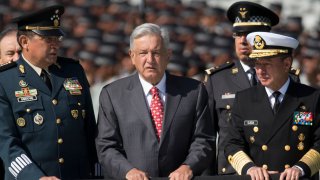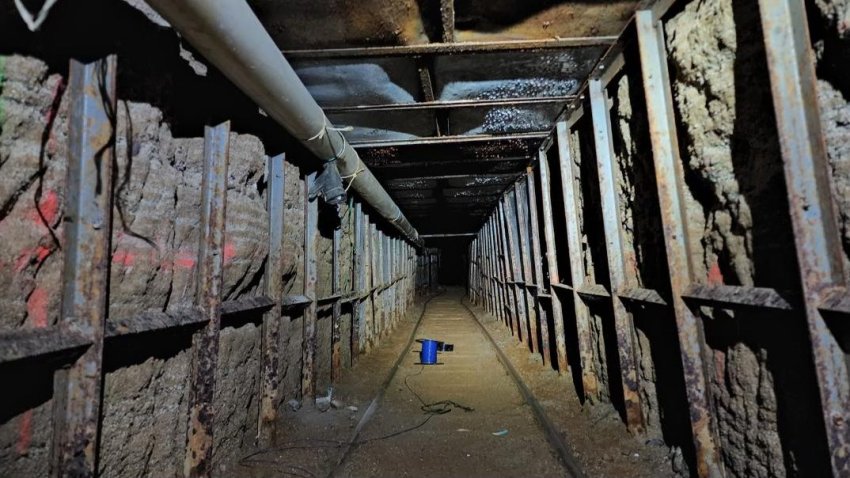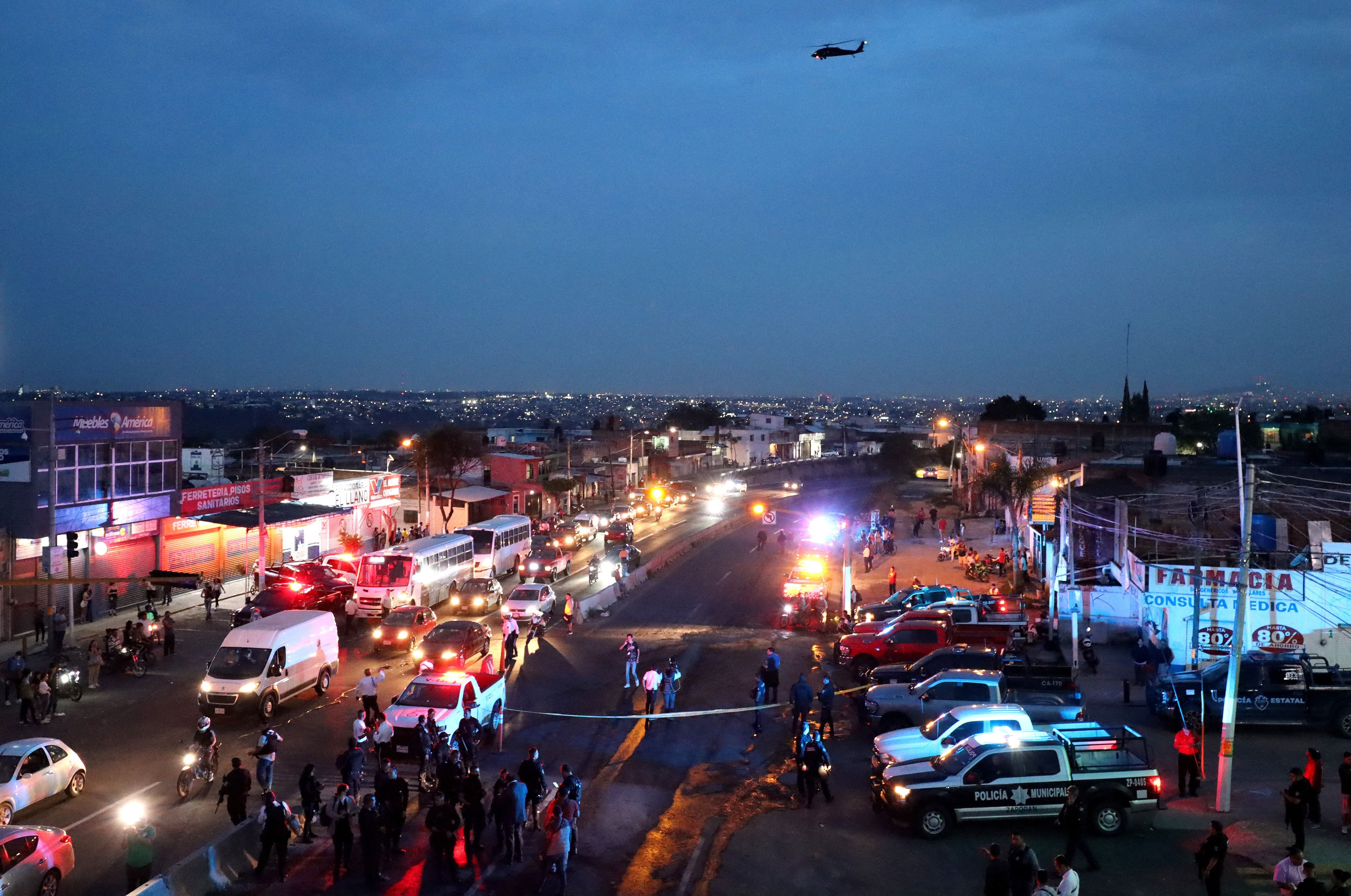
FILE – Mexican President Andres Manuel Lopez Obrador, flanked by Defense Secretary Gen. Luis Crescencio Sandoval, left, and Marine Secretary Jose Rafael Ojeda, surveys National Guard troops as the new force is presented at a ceremony, in Mexico City, June 30, 2019.
Mexico’s president has begun exploring plans to sidestep congress to hand formal control of the National Guard to the army, a move that could extend the military’s control over policing in a country with high levels of violence.
That has raised concerns because President Andrés Manuel López Obrador won approval for creating the force in 2019 by pledging in the constitution that it would be under nominal civilian control and that the army would be off the streets by 2024.
Neither the National Guard nor the military have been able to lower the insecurity in the country, however. This past week, drug cartels staged widespread arson and shooting attacks, terrifying civilians in three main northwest cities in a bold challenge to the state.
Still, López Obrador wants to keep soldiers involved in policing, and remove civilian control over the National Guard, whose officers and commanders are mostly soldiers, with military training and pay grades.
But the president no longer has the votes in congress to amend the constitution and has suggested he may try to do it as a regulatory change with a simple majority in congress or by an executive order and see if the courts will uphold that.
López Obrador warned Friday against politicizing the issue, saying the military is needed to fight Mexico’s violent drug cartels. But then he immediately politicized it himself.
“A constitutional reform would be ideal, but we have to look for ways, because they (the opposition) instead of helping us, are blocking us, there is an intent to prevent us from doing anything,” López Obrador said.
The two main opposition parties also had different positions when they were in power. They supported the army in public safety roles during their respective administrations beginning in 2006 and 2012.
When López Obrador was running for president, he called for taking the army off the streets. But being in power — and seeing homicides running at their highest sustained levels ever — apparently changed his mind.
Feeling out of the loop? We'll catch you up on the Chicago news you need to know. Sign up for the weekly Chicago Catch-Up newsletter.
He has relied heavily on the military not just for crime-fighting. He sees the army and navy as heroic, patriotic and less corruptible, and has entrusted them with building major infrastructure projects, running airports and trains, stopping migrants and overseeing customs at seaports.
Mexico’s army has been deeply involved in policing since the start of the 2006 drug war. But its presence was always understood as temporary, a stop-gap until Mexico could build trustworthy police forces.
López Obrador appears to have abandoned that plan, instead making the military and quasi-military force like the National Guard the main solution. “Their mandate has to be prolonged,” he said.
“I think the best thing is for the National Guard to be a branch of the Defense Department to give it stability over time and prevent it from being corrupted,” he said. He also wants the army and the navy to help in public safety roles beyond 2024, the current dateline established in a 2020 executive order.
The force has grown to 115,000, but almost 80% of its personnel were drawn from the ranks of the military.
The United Nations and human rights groups have long expressed reservations about having the military do police work. and Mexico's Supreme Court has yet to decide on several appeals against what critics say are unconstitutional tasks given to the National Guard.
The U.N. Human Rights High Commissioner’s office said last week that militarizing civil institutions, such as policing, weakens democracy. Soldiers aren’t trained for that, the military by nature isn’t very open to scrutiny, it has been implicated in human rights abuses, and the presence of troops hasn’t resolved the pressing question of how to reform police, prosecutors and courts.
While López Obrador claims human rights abuses are no longer tolerated, the governmental National Human Rights Commission has received more than a thousand complaints alleging abuses by the National Guard. The agency has issued five recommendations in cases where there was evidence of excessive use of force, torture or abuse of migrants.
“The problem with using the military in civilian roles is that we don’t have any control of what goes on inside” the forces, said Ana Lorena Delgadillo, director of the civic group Foundation For Justice.
Delgadillo said that placing the National Guard under the Defense Department, despite constitutional language defining it as a civilian-commanded force, is “authoritarian,” will be challenged in court and will not help to pacify the country.

The Mexican Employers’ Association, Coparmex, said in a statement that the capabilities of state police should instead be strengthened. “It is them and the (state prosecutors’ offices) that are authorized to interact with the civilian population,” the group said.
Perhaps more to the point, the quasi-military National Guard has not been able to bring down Mexico’s stubbornly high homicide rate.
Sofía de Robina, a lawyer for the Miguel Agustín Pro Juárez Human Rights Center, said the National Guard “has not been able to decrease violence,” in part because of its military-style strategy of “occupying territory.”
While that strategy — of building barracks and conducting regular patrols — may be helpful in remote or rural areas, it has proved less useful and even drawn opposition in urban areas.
Police, who are from the towns they serve and live among the inhabitants, would be more effective, experts say. Yet widespread corruption, poor pay and threats by cartels against police officers have weakened local and state police forces.
Over 15 years of experience with the military in policing roles has shown “the falseness of the paradigm that the army was going to solve the problems,” Delgadillo said.
De Robina added that López Obrador’s latest move means trying to keep the military in policing indefinitely, “completely defying the obligation that public safety be civil” with no limits on time or strategy.



